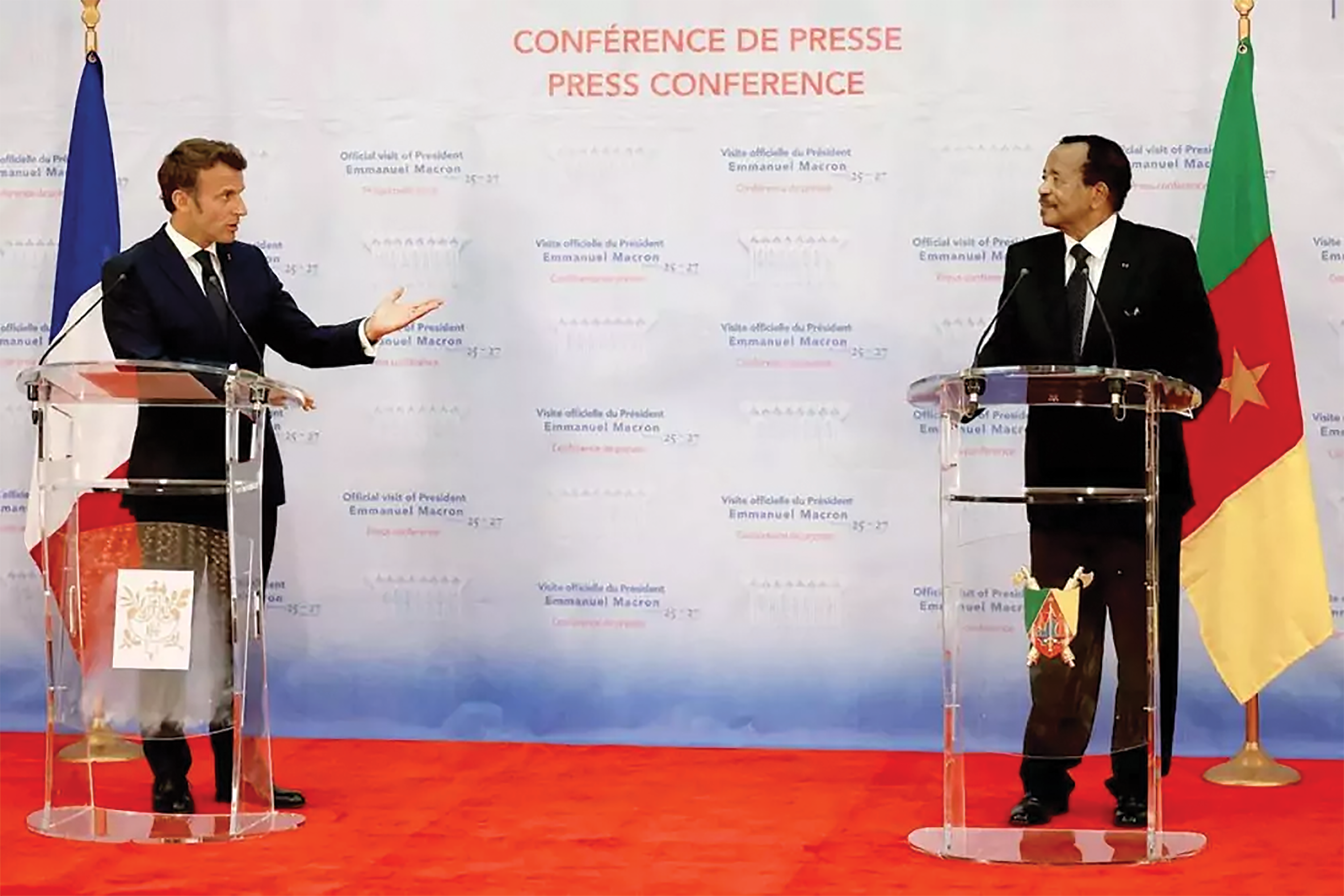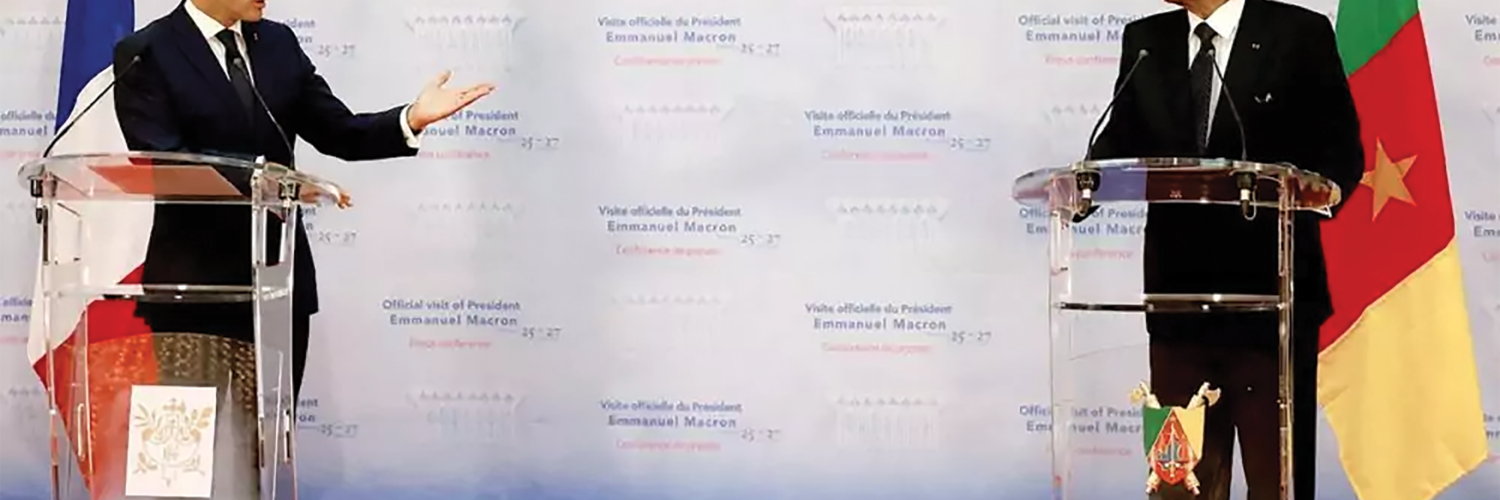RAPPROCHEMENT: Exactly one year ago, on July 26 2022, French President Emmanuel Macron announced the creation of a commission of historians to shed light on France’s colonial past in Cameroon. One year on, this commission has barely got off the ground and while expectations are high…
By Julia Crawford

Speaking at a press conference in Yaoundé with Cameroonian President Paul Biya on July 26 2022, French President Emmanuel Macron said he wanted historians from both countries to work together on investigating the past and establish “responsibilities” on France’s bloody colonial past in Cameroon. He promised that France’s archives on its colonial rule would be “opened in full”.
Initiated by the French presidency in coordination with French academics and their partners in Cameroon, this commission was officially launched in March 2023. According to one of its co-presidents, French historian Karine Ramondy, the impetus came from civil society in France and Cameroon and was backed by the two countries’ presidents. Despite requests to its members, this publication was unable to obtain further clarification on the statute or founding document of this commission, nor on the way its members were appointed.
Hugo Jombwe, a Cameroonian human rights lawyer based in Africa for Belgian non-profit RCN Justice & Democracy, says he welcomed the news with cautious optimism. “We know that the history between Cameroon and France is complex and troubled, so it is a very long-standing demand [notably from researchers and human rights activists] that light be shed on what happened,” he told Justice Info. “But we also know that the Cameroonian authorities have not, since independence shown much will to do this. And in France too, for 50 years there has been no will to re-examine this history. That inspires some caution, because one can ask if these States have really changed after 50 years.”
On the French side, this commission is presented as part of Macron’s expressed desire for a “new relationship” with Africa. It comes after similar initiatives under his presidency, notably the Vincent Duclert commission on France’s role in the Rwandan genocide (2021) and the Benjamin Stora report on France’s colonisation and war in Algeria (2021).
Richard Joseph, a political science professor at Northwestern University in the United States who has dedicated research and written books on Cameroon’s colonial history, also welcomed news of the commission’s creation. But he has questions. “Will the work of the commission be reflected in open debates in Cameroon? Will researchers be able to conduct studies and deliver their findings without fear of retribution? Will compensation be provided to victims of the repression and their families?” he asks. Joseph also hopes the commission’s work might lead to more political freedom in Cameroon.
BLOODY REPRESSION
After being colonised by Germany in the 19th century, Cameroon was split between France (80%) and Britain (20%) in 1919 after Germany’s defeat in the First World War. For years preceding French Cameroon’s independence in 1960, French authorities waged a bloody campaign of repression against independence fighters of the UPC (Union des populations du Cameroon), a nationalist party engaged in armed struggle.
Tens of thousands of UPC activists were massacred first by the French army and then after independence by the Cameroonian army of Ahmadou Ahidjo, the independent country’s first president who collaborated with the French. Cameroon’s current 90-year-old president for more than 40 years Biya was a Prime Minister under Ahidjo.
Prominent UPC activists murdered by the French include anti-colonialist leader Ruben Um Nyobè and Félix Roland Moumié, widely thought to have been poisoned in Geneva in 1960 by an agent of the French secret services, although the case was dismissed by a Swiss court for lack of evidence.
The commission is mandated to examine the “role of France in Cameroon in the fight against independence and opposition movements between 1945 and 1971”. It is expected to present a report by the end of 2024. Jombwe thinks the historical mandate period is good but should also include 1972, the year of a national referendum which led to the former British and French parts of Cameroon becoming a unitary state. The country is still divided, he notes, with Biya’s regime having waged violent repression against separatists in the marginalised Anglophone parts of the country.
HISTORIANS AND A MUSICIAN
The commission is co-chaired by French historian Karine Ramondy and Cameroonian musician Blick Bassy, who dedicated one of his albums, “1958”, to assassinated anti-colonialist leader Ruben Um Nyobè. Bassy is in charge of the cultural aspect of the commission’s work. The rest of the commission is composed of 14 historians (plus Ramondy), with an equal number from Cameroon and France. There are five women and ten men (11 including Bassy).
The decolonisation of Cameroon and bloody repression carried out by France, which some historians have called a war, “has very little visibility, notably in France, where it is not taught in schools, unlike the Algerian war”, Ramondy told AFP news agency in March. “That will be one of the tasks of the commission, to make visible” this chapter of history.
Bassy, who will gather oral testimonies in Cameroon, told their launch press conference that he would not work with the historians but rather with people and associations on the ground. He stressed the “unique aspect of this heritage and culture part” of the commission’s work. Bassy’s co-presidency of the commission was sharply criticised when it was announced, notably by the Cameroonian History Society, which said it was “more than an insult” to them that an artist had been chosen rather than a Cameroonian historian alongside Ramondy.
Jombwe does not agree. He says Bassy has always shown an interest in this chapter of history and is not too concerned about political correctness, so can play a role to make sure that “nothing is pushed aside” in the commission’s work. Contacted by Justice Info, members of the commission did not wish to comment further. “We are currently at work with our teams, and will not hesitate to reply when we are well advanced in our work,” Ramondy wrote in answer to our email.
COLONIAL POWER
Jombwe says it is not just a question of reconciling France and Cameroon with their shared history but of reconciling Cameroonians. “Expectations are immense,” he says, because in Cameroon the authorities “have a bad conscience with regard to that chapter” and have never wanted to seek the truth. “This period of decolonisation is not even taught in Cameroon, because there has been a taboo, a big split in the country between those who fought for decolonisation and independence, and those who collaborated with the colonial power [France] and inherited power.”
He thinks the commission’s work is important, not only to reconcile Francophone Cameroon, but also for the unity between the Francophone and Anglophone parts. The ongoing conflict between Anglophone separatists and the Cameroonian authorities “has its roots” in the independence struggle, he says. “At the time when the territories under French and British mandates were unified [following a referendum in 1972], there were members of the Anglophone part that were opposed, not because they didn’t want unity, but because they said to themselves that the Francophone part is controlled by France,” Jombwe notes. “And this division has been made worse by the government’s policies since independence and the feeling that the Anglophones are marginalised.”
“Cameroon has underperformed in many areas of public life and is accorded minimal attention globally,” Joseph told Justice Info. “It is the independence movement that worked for the reunification of the former French and British Cameroons. These aspirations have never been truly fulfilled. A tragic armed struggle is one of the consequences. As the deep silence is lifted, restorative light can be shone on this nation’s past.”
It remains to be seen what this commission will produce by the end of next year, and what follow-up there might be in terms of recommendations and reparations for the families of murdered victims.
- Article sourced from Justiceinfo.net, an independent media outlet covering justice initiatives in countries dealing with serious violence. It is based in Lausanne, Switzerland
Published on the 112th Edition































